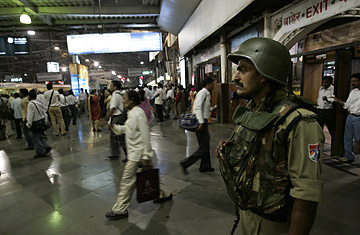
A police officer stands guard in Chhatrapati Shivaji Terminus train station, Mumbai, as rumours of further terrorist attacks circulate.
Whenever terrorism rears its head in India, it has probably left its tail in Pakistan. Or so seems the knee-jerk instinct of many Indians. But in the wake of last week's Mumbai terrorist attacks, that sentiment may be, in this instance, correct. Ongoing investigations by Indian police — helped in part by the capture of the sole surviving terrorist, 21-year-old Pakistani Ajmal Amir Kasab — suggest that the attacks may have been conceived and carried out primarily by Pakistanis, with the backing of noted terrorist organizations acting within Pakistani territory. This is a revelation that will surprise few Indians and provide fresh political capital to others. Already, the Shiv Sena, a Hindu nationalist group based in Mumbai, has openly declared that it won't allow Pakistani artists to perform in the city. Even ordinary civilians are turning hawkish. "We need to tell them that enough is enough," says Sheikh Noor Ahmed, who owns a hotel close to the bombed-out Taj Mahal here in South Mumbai. "Gandhi's days are gone. Gone are the times when we'd turn the other cheek if someone slapped us." (See pictures of Mumbai after the massacre.)
But how India can slap back at its troublesome neighbor is a question with no easy answer. Recent months have seen a significant thawing in ties between the two nations, with trade expanding across the heavily militarized Kashmir border. Pakistani President Asif Zardari has made pronounced gestures of friendship, some of which have put him in hot water with his own people — such as his statement earlier this year that he did not consider India, with whom Pakistan has fought three bitter wars since 1947, a threat to its western neighbor.
Though the thirst for solid action is palpable among Indians, Prime Minister Manmohan Singh and his ruling Congress Party do not want to undermine the growing relationship with their Pakistani counterparts, which, until the attacks, promised to be one of the more fruitful ententes in South Asia's fractious history. In the days after the events of Nov. 26, New Delhi never explicitly pointed fingers at Pakistan — let alone massed troops along the border or escalated tensions the way a preceding government in 2001 had done after militants struck the Parliament building. "You have to take action without undercutting the people who want to cooperate with you," says Amitabh Dubey, director of India research for Trusted Sources, a London-based risk consultancy firm. "But they're going to have to be seen to do something."
